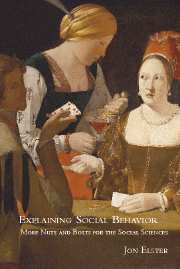3 - Interpretation
from I - EXPLANATION AND MECHANISMS
Summary
Interpretation and Explanation
In many writings on the humanities, the focus has been on interpretation rather than explanation. In the German tradition, a contrast was often drawn between the “spiritual sciences” (Geisteswissenschaften) and the natural sciences (Naturwissenschaften). In the former, we are told, the proper procedure is that of interpretation or “understanding” (Verstehen). For the latter the appropriate language is that of explanation (Erklären). Max Weber wrote, for instance, that natural science does not aim at “understanding” the behavior of cells.
We may then ask whether the social sciences rely on understanding or on explanation. I believe this question is wrongly put. In my view, to interpret is to explain. Interpretation is nothing but a special case of the hypothetico-deductive method (Chapter 1). Scholars in the humanities cannot, for instance, use “empathy” as a privileged shortcut to the interpretation of behavior, since one scholar's empathetic understanding may differ from that of another. To decide among conflicting interpretations they have to confront these interpretive hunches or hypotheses (for that is what they are) with experience. As I argued in Chapter 1, experience includes not only the facts we are trying to understand, but also novel facts that we might not otherwise have thought about investigating.
Information
- Type
- Chapter
- Information
- Explaining Social BehaviorMore Nuts and Bolts for the Social Sciences, pp. 52 - 66Publisher: Cambridge University PressPrint publication year: 2007
